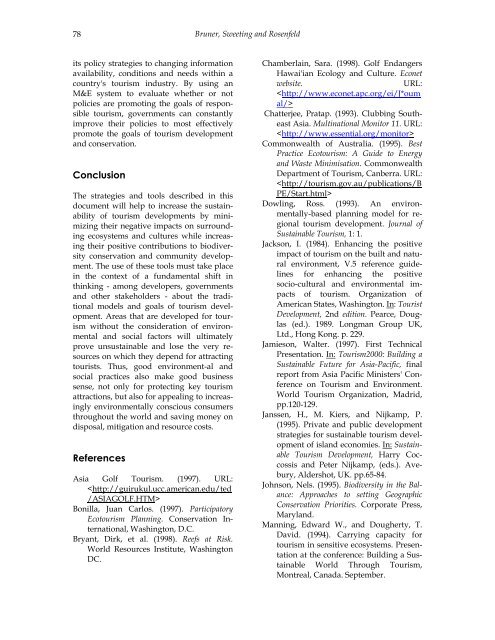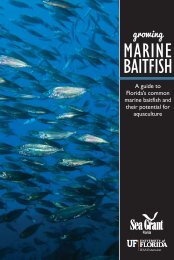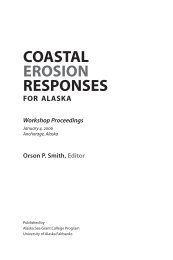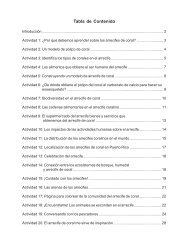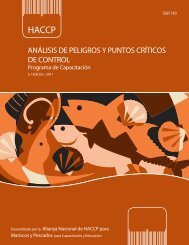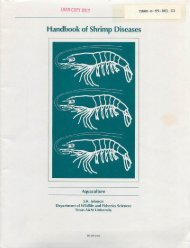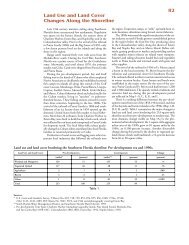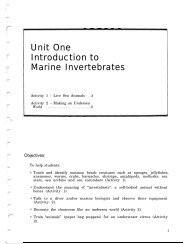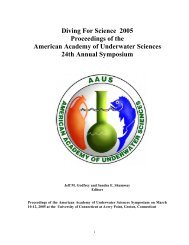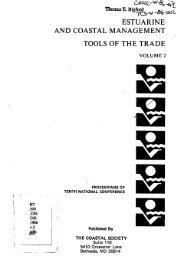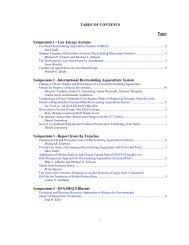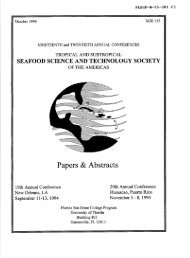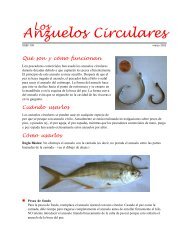THE GREEN HOST EFFECT: AN INTEGRATED APPROACH TO ...
THE GREEN HOST EFFECT: AN INTEGRATED APPROACH TO ...
THE GREEN HOST EFFECT: AN INTEGRATED APPROACH TO ...
Create successful ePaper yourself
Turn your PDF publications into a flip-book with our unique Google optimized e-Paper software.
78<br />
its policy strategies to changing information<br />
availability, conditions and needs within a<br />
country's tourism industry. By using an<br />
M&E system to evaluate whether or not<br />
policies are promoting the goals of responsible<br />
tourism, governments can constantly<br />
improve their policies to most effectively<br />
promote the goals of tourism development<br />
and conservation.<br />
Conclusion<br />
The strategies and tools described in this<br />
document will help to increase the sustainability<br />
of tourism developments by minimizing<br />
their negative impacts on surrounding<br />
ecosystems and cultures while increasing<br />
their positive contributions to biodiversity<br />
conservation and community development.<br />
The use of these tools must take place<br />
in the context of a fundamental shift in<br />
thinking - among developers, governments<br />
and other stakeholders - about the traditional<br />
models and goals of tourism development.<br />
Areas that are developed for tourism<br />
without the consideration of environmental<br />
and social factors will ultimately<br />
prove unsustainable and lose the very resources<br />
on which they depend for attracting<br />
tourists. Thus, good environment-al and<br />
social practices also make good business<br />
sense, not only for protecting key tourism<br />
attractions, but also for appealing to increasingly<br />
environmentally conscious consumers<br />
throughout the world and saving money on<br />
disposal, mitigation and resource costs.<br />
References<br />
Asia Golf Tourism. (1997). URL:<br />
<br />
Bonilla, Juan Carlos. (1997). Participatory<br />
Ecotourism Planning. Conservation International,<br />
Washington, D.C.<br />
Bryant, Dirk, et al. (1998). Reefs at Risk.<br />
World Resources Institute, Washington<br />
DC.<br />
Bruner, Sweeting and Rosenfeld<br />
Chamberlain, Sara. (1998). Golf Endangers<br />
Hawai'ian Ecology and Culture. Econet<br />
website. URL:<br />
<br />
Chatterjee, Pratap. (1993). Clubbing Southeast<br />
Asia. Multinational Monitor 11. URL:<br />
<br />
Commonwealth of Australia. (1995). Best<br />
Practice Ecotourism: A Guide to Energy<br />
and Waste Minimisation. Commonwealth<br />
Department of Tourism, Canberra. URL:<br />
<br />
Dowling, Ross. (1993). An environmentally-based<br />
planning model for regional<br />
tourism development. Journal of<br />
Sustainable Tourism, 1: 1.<br />
Jackson, I. (1984). Enhancing the positive<br />
impact of tourism on the built and natural<br />
environment, V.5 reference guidelines<br />
for enhancing the positive<br />
socio-cultural and environmental impacts<br />
of tourism. Organization of<br />
American States, Washington. In: Tourist<br />
Development, 2nd edition. Pearce, Douglas<br />
(ed.). 1989. Longman Group UK,<br />
Ltd., Hong Kong. p. 229.<br />
Jamieson, Walter. (1997). First Technical<br />
Presentation. In: Tourism2000: Building a<br />
Sustainable Future for Asia-Pacific, final<br />
report from Asia Pacific Ministers' Conference<br />
on Tourism and Environment.<br />
World Tourism Organization, Madrid,<br />
pp.120-129.<br />
Janssen, H., M. Kiers, and Nijkamp, P.<br />
(1995). Private and public development<br />
strategies for sustainable tourism development<br />
of island economies. In: Sustainable<br />
Tourism Development, Harry Coccossis<br />
and Peter Nijkamp, (eds.). Avebury,<br />
Aldershot, UK. pp.65-84.<br />
Johnson, Nels. (1995). Biodiversity in the Balance:<br />
Approaches to setting Geographic<br />
Conservation Priorities. Corporate Press,<br />
Maryland.<br />
Manning, Edward W., and Dougherty, T.<br />
David. (1994). Carrying capacity for<br />
tourism in sensitive ecosystems. Presentation<br />
at the conference: Building a Sustainable<br />
World Through Tourism,<br />
Montreal, Canada. September.


